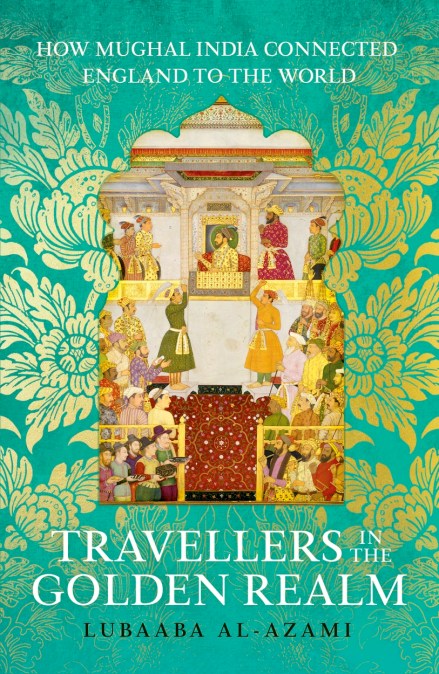Travellers in the Golden Realm
On sale
18th July 2024
Price: £25
Shortlisted for The British in India Book Prize 2025
‘A spellbinding account of the first forgotten half of the English encounter with India with a fascinating history of the Mughal Empire’ JOSEPHINE QUINN, author of How the World Made the West
‘Compelling, highly readable’ NANDINI DAS, author of Courting India
‘Remarkable’ THE TIMES
When the first English travellers in India encountered an unimaginable superpower, their meetings would change the world.
Before the East India Company and before the British Empire, England was a pariah state. Seeking better fortunes, 16th and 17th century merchants, pilgrims and outcasts ventured to the kingdom of the mighty Mughals, attempting to sell coarse woollen broadcloth along the silk roads; playing courtiers in the Mughal palaces in pursuit of love; or simply touring the sub-continent in search of an elephant to ride.
Into this golden realm went Father Thomas Stephens, a Catholic fleeing his home; the merchant Ralph Fitch looking for jewels in the markets of Delhi; and John Mildenhall, an adventurer revelling in the highwire politics of the Mughal elite. It was a land ruled from the palatial towers by women – the formidable Empress Nur Jahan Begim, the enterprising Queen Mother Maryam al-Zamani, and the intrepid Princess Jahanara Begim. Their collision of worlds helped connect East and West, launching a tempestuous period of globalisation spanning from the Chinese opium trade to the slave trade in the Americas.
Drawing on rich, original sources, Lubaaba Al-Azami traces the origins of a relationship between two nations – one outsider and one superpower – whose cultures remain inextricably linked to this day.
‘Illuminating and engrossing’ THE TELEGRAPH
‘Vital’ SUZANNAH LIPSCOMB, author of A Visitor’s Companion to Tudor England
‘A spellbinding account of the first forgotten half of the English encounter with India with a fascinating history of the Mughal Empire’ JOSEPHINE QUINN, author of How the World Made the West
‘Compelling, highly readable’ NANDINI DAS, author of Courting India
‘Remarkable’ THE TIMES
When the first English travellers in India encountered an unimaginable superpower, their meetings would change the world.
Before the East India Company and before the British Empire, England was a pariah state. Seeking better fortunes, 16th and 17th century merchants, pilgrims and outcasts ventured to the kingdom of the mighty Mughals, attempting to sell coarse woollen broadcloth along the silk roads; playing courtiers in the Mughal palaces in pursuit of love; or simply touring the sub-continent in search of an elephant to ride.
Into this golden realm went Father Thomas Stephens, a Catholic fleeing his home; the merchant Ralph Fitch looking for jewels in the markets of Delhi; and John Mildenhall, an adventurer revelling in the highwire politics of the Mughal elite. It was a land ruled from the palatial towers by women – the formidable Empress Nur Jahan Begim, the enterprising Queen Mother Maryam al-Zamani, and the intrepid Princess Jahanara Begim. Their collision of worlds helped connect East and West, launching a tempestuous period of globalisation spanning from the Chinese opium trade to the slave trade in the Americas.
Drawing on rich, original sources, Lubaaba Al-Azami traces the origins of a relationship between two nations – one outsider and one superpower – whose cultures remain inextricably linked to this day.
‘Illuminating and engrossing’ THE TELEGRAPH
‘Vital’ SUZANNAH LIPSCOMB, author of A Visitor’s Companion to Tudor England
Newsletter Signup
By clicking ‘Sign Up,’ I acknowledge that I have read and agree to Hachette Book Group’s Privacy Policy and Terms of Use
Reviews
A compelling, highly readable account of the earliest phase of English presence in India - Al-Azami deftly combines familiar stories with significantly less familiar figures to vividly bring to life a period of immense change for both nations involved
Brings the Mughal world of the seventeenth century to life in all its colourful, vivid complexity. Al-Azami betrays a masterful eye for detail, telling the story of how the English tried to navigate the dazzling wealth, power, and cultural dynamism of the Indian subcontinent, though rarely with success. This book is a must read.
This is a remarkable book. It combines a spellbinding account of the first forgotten half of the English encounter with India with a fascinating history of the Mughal Empire
Disrupts the conventional narrative to give a vital pre-history to the Raj, when the indomitable empire in question was Indian not British
In this compelling and entertaining book, Lubaaba Al-Azami surveys the first century of British travel to India and its remarkable stories of encounter and error, ambition and anxiety. The book has much to teach about the sources and the aftermath of both British and Indian histories ever since
A fascinating and timely account of the earliest Anglo-Indian encounters, Al-Azami deftly recreates a crucial period in early British imperial history
A detailed, nuanced and yet utterly engrossing exploration . . . Eloquent prose binds together a treasure trove of fascinating facts with the capacity to see Britain and the world in an entirely different, richer way. Unputdownable!
Illuminating and engrossing
Fascinating . . . Lubaaba Al -Azami's closely researched portrayal of these pioneers describes formative early encounters between East and West, and sets the scene for the age of colonialism and globalisation that would follow
Remarkable . . . Al-Azami writes with a playful urbanity and excels at the interplay of geopolitics and personal ambition . . . a welcome corrective to our parochial understanding of Tudor and Stuart England
This lively book digs away at the outdated idea that the British ascendancy there was somehow predestined or foreseeable

